2019-2020学年人教版高中英语选修九学案讲义:Unit 1 breaking recorders-语法篇(教师版)
- 格式:doc
- 大小:5.57 MB
- 文档页数:12
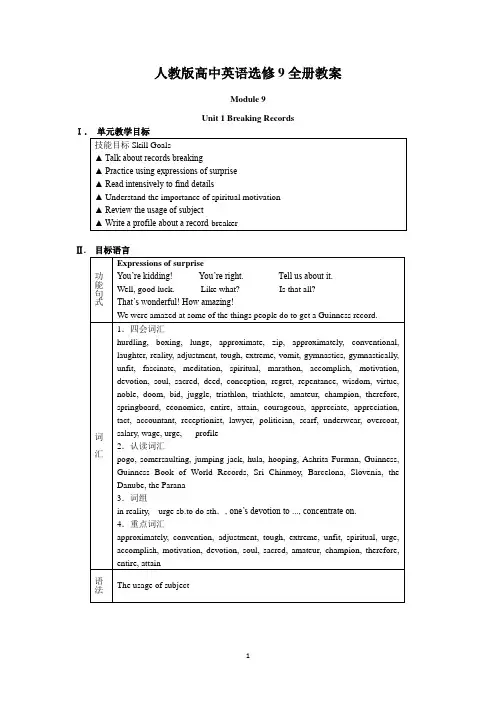
人教版高中英语选修9全册教案Module 9Unit 1 Breaking RecordsI.单元教学目标ⅡⅢ. 教材分析与教材重组1. 教材分析本单元的中心话题是“破记录”,所谈论的内容涉及多项打破吉尼斯世界纪录的故事。
旨在通过单元教学,使学生能够根据一些已知事实内容,结合贴切的表达来反映人们挑战自我、持之以恒、坚定信心并最终达成目标的精神,并就此发表自己的观点和看法,能根据谈论过的话题写出条理清晰的短文。
1.1 Warming up 通过讨论4幅为人们所熟知的体育赛事图片,引发学生对于学习本单元的兴趣和主观能动性,对于课本中将要涉及到的内容先产生浓厚的求知欲;教师可借此给学生进一步介绍有关吉尼斯世界记录的背景知识,同时布置自主学习的任务,即让学生自己通过网络及书籍查找申请该记录的程序和方法,鼓励多手段,多方法的自主性学习方式。
1.2 Pre-reading这一部分是Reading的铺垫。
结合图片与文字来介绍在欧美,乃至全世界都非常流行的特殊体育运动项目,如弹簧单高跷、翻筋斗、跳爆竹、呼拉圈等。
通过这种方式我们即培养了学生快速理解介绍性文字的能力,又学习了如何用简单易懂的文字来做描述,同时也为阅读文章作好了背景知识的准备。
1.3 Reading讲述的是著名的吉尼斯世界记录保持者,美国人阿西里塔·福尔曼的故事。
在这一部分当中,学生除了学习新的词汇、短语及句型结构外,主要接受阅读技巧的训练,即通过扫读及精读结合的方式训练“找、记细节”的能力;以及对文章中主人公取得成绩背后的精神支持的深层理解。
另外,学生们通过对文章模拟性复述和典型段落的背诵,来输入丰富的表达方式,为写作中如何介绍人物或事件打下基础。
1.4 Comprehending (即Post-reading)主要通过设置阅读理解性题目来辅助学生理解课文,达到训练目标。
1.5 Learning about language分词汇和语法两部分,即Discovering useful words and expressions 和Revising useful structures。

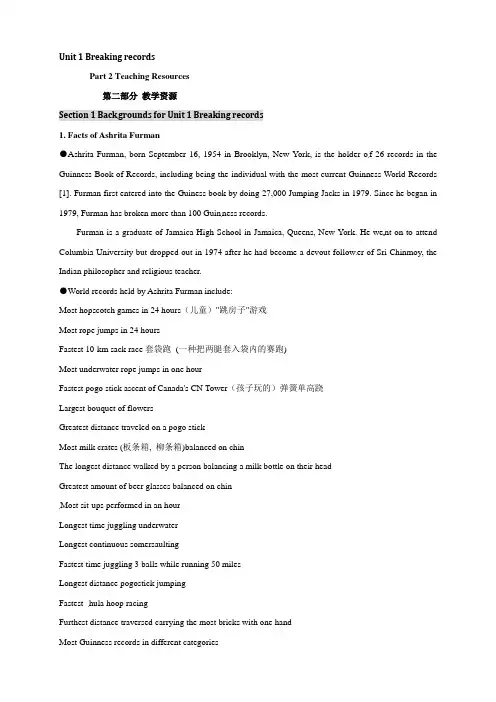
Unit 1 Breaking recordsPart 2 Teaching Resources第二部分教学资源Section 1 Back grounds for Unit 1 Breaking records1. Facts of Ashrita Furman●Ashrita Furman, born September 16, 1954 in Brooklyn, New York, is the holder o f 26 records in the Guinness Book of Records, including being the individual with the most current Guinness World Records [1]. Furman first entered into the Guiness book by doing 27,000 Jumping Jacks in 1979. Since he began in 1979, Furman has broken more than 100 Guin ness records.Furman is a graduate of Jamaica High School in Jamaica, Queens, New York. He we nt on to attend Columbia University but dropped out in 1974 after he had become a devout follow er of Sri Chinmoy, the Indian philosopher and religious teacher.●World records held by Ashrita Furman include:Most hopscotch games in 24 hours(儿童)"跳房子"游戏Most rope jumps in 24 hoursFastest 10-km sack race套袋跑(一种把两腿套入袋内的赛跑)Most underwater rope jumps in one hourFastest pogo stick ascent of Canada's CN Tower(孩子玩的)弹簧单高跷Largest bouquet of flowersGreatest distance traveled on a pogo stickMost milk crates (板条箱, 柳条箱)balanced on chinThe longest distance walked by a person balancing a milk bottle on their headGreatest amount of beer glasses balanced on chinMost sit-ups performed in an hourLongest time juggling underwaterLongest continuous somersaultingFastest time juggling 3 balls while running 50 milesLongest distance pogostick jumpingFastest hula hoop racingFurthest distance traversed carrying the most bricks with one handMost Guinness records in different categories2. “Guinness” Comes into Our CollegeDo you want to be the keeper of “Guinness Record?” It is not a dream anymore. The first “College Guinness Record” is going to be held on the p layground, on April 2th. Now, everybody has a chance to become one of the “Guinness Records” keepers.As interest ing as the Guinness W orld Records, College Guinness Records also have different kinds of items, such as lowest bike-ri der, fastest cell phone message-sender, most basketball-shooter, etc. Students can not only take part in competitions which have been already set, but also have the rights to give suggestions to add what they are good at. Every record-maker will be awarded a certifi cation. In addition, their names will be written in COLLEGE GUINNESS RECORDS.The applications for joining in the game started from March 21st. Students can apply from their apartment manager or 5B 310 of Science Building. Meanwhile, another much more convenient way is recommended& not;–sending e-mail to SXS@, involving: the basic information like your name and major; item or items you will participate in, like lowest bike-rider; they way how to contact with you, like your cell phone and dormitory num ber. If one misses sending application, he/she can still come to the spot and join in the competition on 2nd, April. Before the game sta rts everyone is still welcome.“The Incredible Will Take Place”, as the slogan manifests, students will discover the ir potentials they have never known through “College Guinness Records”. What’s more, such funny game helps enrich our college life.Zhai Xuejia。

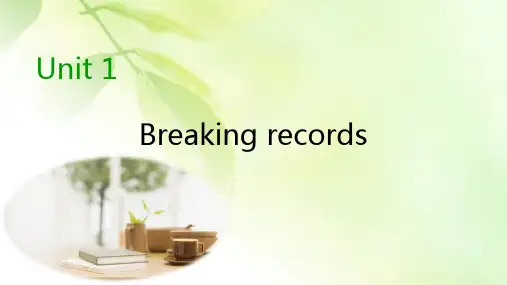
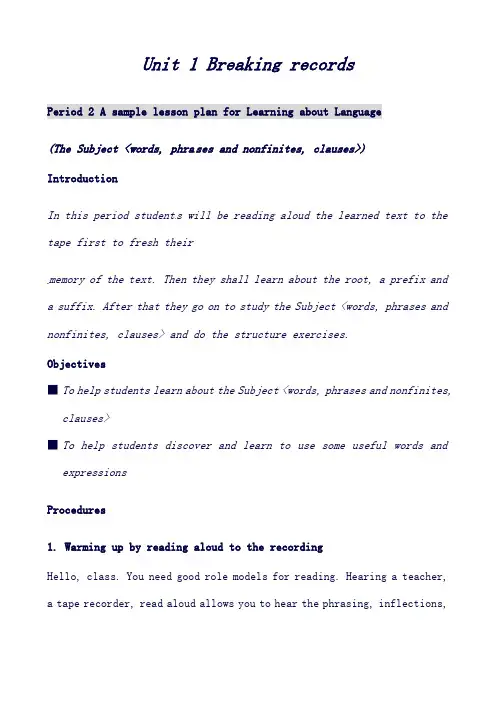
Unit 1 Breaking recordsPeriod 2 A sample lesson plan for Learning about Language(The Subject <words, phrases and nonfinites, clauses>)IntroductionIn this period students will be reading aloud the learned text to the tape first to fresh theirmemory of the text. Then they shall learn about the root, a prefix and a suffix. After that they go on to study the Subject <words, phrases and nonfinites, clauses> and do the structure exercises.Objectives■To help students learn about the Subject <words, phrases and nonfinites, clauses>■To help students discover and learn to use some useful words and expressionsProcedures1. Warming up by reading aloud to the recordingHello, class. You need good role models for reading. Hearing a teacher, a tape recorder, read aloud allows you to hear the phrasing, inflections,and expressions that a good reader uses. How can you learn this if all you hear is your classmates stumbling through an oral passage?Buy a tape recorder and the tapes to go with the textbooks to read aloud to the recordings.Now listen and read to the recording of the text "THE ROAD IS ALWAYS AHEAD OF YOU".2. Discovering useful words and expressionsAn English word can consist of three parts: the root, a prefix and a suffix.The root is the part of the word that contains the basic meaning (definition) of the word. The root is the base element of the word. A prefix is a word element that is placed in front of a root. A prefix changes the word's meaning or makes a new word. A suffix is a word element that is placed after the root. The suffix changes the word's meaning as well as its function (use). Prefixes and suffixes are called affixes because they are attached to a root.Now go to page 4 do exercises 1, 2 and 3. While doing exercise 3 on page 5, you may make use of the following list of sporting events.3. Learning about t he subjectEvery complete sentence contains two parts: a subject and a predicate. The subject is what (or whom) the sentence is about, while the predicate tells something about the subject.The subject of a sentence is the person, place, thing, or idea that is doing or being something. You can find the subject of a sentence if you can find the verb.Ask the question, "Who or what 'verbs' or 'verbed'?" and the answer to that question is the subject. For inst ance, in the sentence "The computers in the Learning Center must be replaced," the verb is "must be replaced." What must be replaced? The computers. So the subject is "computers." A simple subject is the subject of a sentence stripped of modifiers.B.WhoC.WhateverD.Whoever4. Building your structure power by doing exercisesTo consolidate your understanding of the Subject <words, phrases and nonfinites, clauses>, please go on to do exercises 1 and 2 on page 5 and 6.5. Closing down by talking about world record in cycling backwards with violin60,45 km in 5h 09 min.Some personal data :Christian Adam (neé Patzig)born 11.11.1963 in Meldorf / Germanylearned cycling at the age of 4playing violin since 1970studying music with main subject violine inHamburg 1981-89participant in several orchestrassince 1988 working full-time as aviolinmaker2000 examination for the master craftman´s diploma as a violin maker。
![[精品]新人教版选修9高中英语 unit 1 breaking records 单元优质课教案](https://uimg.taocdn.com/7ca1394ea45177232f60a2b4.webp)
Unit 1 Breaking records!I.单元教学目标技能目标Goals ▲0 Talk about records, adventures and hobbies ▲1 Practise expressing surprise ▲2 Review the subject ▲3 Complete smmmaryII.目标语言功能句式1. Talk about records, adventures and hobbies2. Practise expressing surprise:You’re kidding! Is that all? That’s wonderful! How amazing!词汇1. 四会词汇hurdling, boxing, lunge, approximate, conventional, laughter, reality, adjustment, tough, extreme, vomit, gymnastic, unfit, fascinate, meditation, spiritual, marathon, urge, accomplish, motivation, devotion.. ,2. 认读词汇hula hoping, Guinness Book of World Records3. 词组in reality4.重点词汇in reality, break records, a sense of balance,…语法Review the Subject重点句子1.While these activities might seem childish and cause laughter rather than respect, in reality they require an enormous amount of strength and fitness as well as determination.ReadingTeaching procedures & waysStep I Leading inT: Well, at the very beginning, here is a quite easy question for you: Do you know the host city for the 2008 Olympic Games? Ss: Of course! It's our capital city—Beijing!T: Yes, it's amazing. All of the people feel proud for our nation. Do you still remember the 2004 Olympic Games held in Sydney? Ss: Yes. In that Olympic Games, China has won 28golden medals and ranked the second.T: And who impressed you most?Ss: ( Students here may list quite a lot of sportsmen and sportswomen. And the teacher can take Liu Xi-ang as an example for he is the first Asian who won the golden medal in hurdling.) T: Yes, they are the heroes for our nation.Step II Warming UpT: Well, now, let's look at these pictures on Page 1 nd talk abouthow these participants are feeling.Ss: Exultant: Because Liu Xiang is the first sian who won the hurdling, which belongs tothe track and field —the weakest item for A sian.Calm: Participants are so strong in some certain spectator sports that they are confidentin winning the golden medals.Exciting: Their hard and dull practicing has been rewarded. We need make efferts to get a good achievementin some areas that are never surceed.T: Behind the applause, medals, flowers and praise, it is hard working, dull practicing, determination, and loneliness and persistent that assist them make the world records, keep them and break them. We admire them.Step III. Pre-readingFirst ask the students to match the pictures with teacher's introduction!Show the imtroductary words and corresponding pictures to th e students one by one.1. A hula hoop is a ring made of wood or plastic, which is used for exercise and fun in gym or any playground. Were you one of those kids who could not resist hollering? Here's how to use one.Steps:a. Take hold of the hula hoop.b. Lower it down to about ankle level.c. Step into it (with both feet).d. Bring it up to just below your waist.e. Hold it with both hands and pull it forward so thatStep IV. Reading1.Fast readingQuickly glance through the text and tick the topics about Ashrita the author does not cover2.Second readingNow read the story more carefully and answer the following questions in groups.3.DiscussionDiscuss some of the Ashrita’s beliefs.and explain.Step IV. Language pointsLanguage studyStep I Word StudyThis part is a consolidation of the words learnt in this unit. Get the students to do the exerciseindependently.Make students do Exx. 1. 2. 3 then check their answers. Sample answers for Ex. 3:Events: gymnastics, marathon, triathlon, track and field, swimming, boxing, tennis, volleyball, table tennis, basketball, soccer, horse-racing, yachting, springboard diving, high jump, horse - vaulting, parachute, heptathlon,The training: tough, tiring, stressful, demanding, difficult, hard, arduous, and laboriousThe event: fascinating, exciting, eye - catching, instructive, encouraging, and appealingStep II. Useful structuresThe students will learn the usage of subject in this part. First give them some examples of the subjects' usage in sentences. Get them to summarize the rules of now to use subject.T: Underline the subject in each sentence and analyze the structure of the subjects. Show students the following sentences.1) Our plane is taking off in five minutes.2) Both were offered jobs immediately.3) One-tenth of the population are elderly people.4) Singing is one of my interests.5) To act like that is childish.6) All work and no play makes Jack a dull boy.7) Whether it is a good plan remains to be seen.8) The unemployed lead a hard life.9) It is no use talking about it now.10) It is against the law to do that.Step III PraticePlease do EXX.1 2Listening and speakingStep I First listeningGet Ss to read exercise 1 and make sure that they understand the information they are listening for. While listening, practice note-taking and key information picking-up. At the same time, this part provides Ss with a topic of speaking.T: This is an interview with two Maryville High School students, Luke and Josh, about their school's bid to break a Guinness record. First look through the Exx. 1-3, and then listen to the tape. After students finishing the three exercises, the teacher can play the tape several times to get more details.Step II Second listening2 Read through the questions first in Ex 2. focus on the ideas as well as some specific information. Then che ck answers in groups.Step III. Third listening3 Play the listening text and stop it after each expression of surprise.Step IV SpeakingRole-play is carried out to help Ss express surprise properly. The Ss are free to create different situations, which also practices their imagination.T: Now it is time to practice using the expressions of surprise. One imagines or thinks of something amazing, and the other one chooses an expression of surprise from the list in Ex. 3 or any others that express surprise. Then you swap the roles. Let's read the example beforehand. SA: I once say a woman who was running backwardscarrying a bag of potatoes. SB: You're kidding! Ss practice in pairs. T: OK. Which group would like to present your workto us? Ss' role-plays must be various. If only their imaginary situation is a bit reasonable and they use the right SURPRISE expressions, teacher should highly evaluate it to encourage them to talk in English.Suppose Ss are not able to create as much situation as possible, teacher might offer helps, such as1. — This novel sells well and is said to have broken the world selling records.— How amazing!2. — He has passed the entrance examination and been admittedto Beijing University.— Well, good luck! Tell me more about it.3. — It is reported that more than 100 people lost their livesdue to the release of poisonous gas.— You're kidding!4. — The population of the earth is increasing so fast that theresources will not support us in less than 100 years. — You're right! That's really horrible!Task TwoIn groups, carry out tasks in Ex. 5. Sample answers:1. A. No. Although body painting is very popular and in style, yet it is not proper for students in middle schools.B. We can try to set a record of most people drawing masks of Beijing Opera.2. A. Most people drawing masks of Beijing Opera.B.Event: Most people draw masks of Beijing Opera.Equipment or supplies needed mask patterns, painting,painting brushesSkills that we need to develop basic knowledge aboutBeijing Opera;skills of simple paintingWho we can ask to donate: time supplies money noon break timethe Student Unionwe make it an ad for a company as well, so the company will donate the money.Step IV AssignmentFinish Exx. 1-3 in LISTENING TASK on Page 56 in the workbook.Reading and writingStep I ReadingThe reading part is the preparation for the writing part, so teacher ought to pay more attention to the Ss' acquisition of the passage structure.T: You've done a great job in the listening practice! Now look at the reading passage on Page 7.Tell me whom it talks about? Ss: Sportspeople.T: What is it about? Ss: The profile of these sportspeople. T: That's it! Now, read this passage carefully and then do the exercises on Page 9. After students complete these, teacher can explain some grammar points to the students. Refer to GrammarII in Appendices.Step II Post-readingGet the students to complete the exercise in Comprehending Suggested answers:WHO Lance ArmstrongWHEN 1999WHERE Tour de FranceWHAT Set the fastest average speed-40.27 km/hrWHO Michellie JonesWHEN 2000WHERE The Sydney Olympic GamesWHAT For the first time, the triathlon had been included in the Olympic Games.WHO Martin StrelWHEN 2000WHERE Danube River in EuropeWHAT The first person ever to swim the entire length of Danube River in Europe.Step III. WritingAsk Ss to write their own profile.。
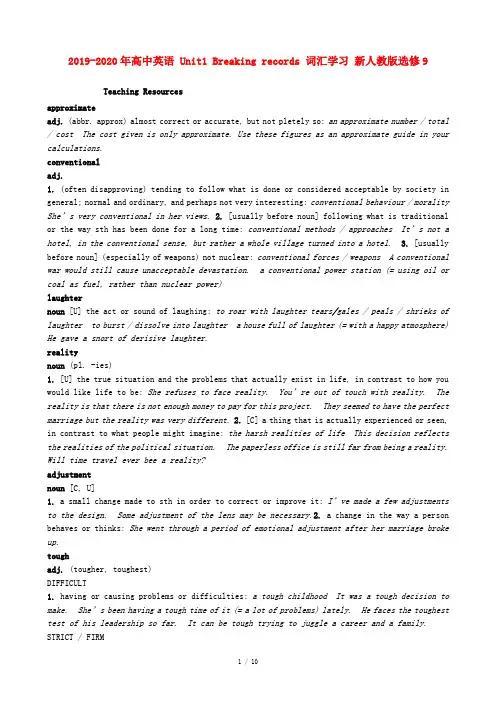
2019-2020年高中英语 Unit1 Breaking records 词汇学习新人教版选修9Teaching Resourcesapproximateadj.(abbr. approx) almost correct or accurate, but not pletely so: an approximate number / total / cost The cost given is only approximate. Use these figures as an approximate guide in your calculations.conventionaladj.1. (often disapproving) tending to follow what is done or considered acceptable by society in general; normal and ordinary, and perhaps not very interesting: conventional behaviour / morality She’s ver y conventional in her views.2. [usually before noun] following what is traditional or the way sth has been done for a long time: conventional methods / approaches It’s not a hotel, in the conventional sense, but rather a whole village turned into a hotel.3. [usually before noun] (especially of weapons) not nuclear: conventional forces / weapons A conventional war would still cause unacceptable devastation. a conventional power station (= using oil or coal as fuel, rather than nuclear power)laughternoun [U]the act or sound of laughing: to roar with laughter tears/gales / peals / shrieks of laughter to burst / dissolve into laughter a house full of laughter (= with a happy atmosphere) He gave a snort of derisive laughter.realitynoun (pl. -ies)1. [U] the true situation and the problems that actually exist in life, in contrast to how you would like life to be: She refuses to face reality. You’re out of touch with reality. The reality is that there is not enough money to pay for this project. They seemed to have the perfect marriage but the reality was very different.2.[C] a thing that is actually experienced or seen, in contrast to what people might imagine: the harsh realities of life This decision reflects the realities of the political situation. The paperless office is still far from being a reality. Will time travel ever bee a reality?adjustmentnoun [C, U]1. a small change made to sth in order to correct or improve it: I’ve made a few adjustments to the design. Some adjustment of the lens may be necessary.2. a change in the way a person behaves or thinks: She went through a period of emotional adjustment after her marriage broke up.toughadj. (tougher, toughest)DIFFICULT1. having or causing problems or difficulties: a tough childhood It was a tough decision to make. She’s been having a tough time of it (= a lot of problems) lately. He faces the toughest test of his leadership so far. It can be tough trying to juggle a career and a family. STRICT / FIRM2.~ (on / with sb/sth) demanding that particular rules be obeyed and showing a lack of sympathy for any problems or suffering that this may cause: Don’t be too tough on him—he was only trying to help. It’s about time teachers started to get tough with bullies. The school takes a tough line on (= punishes severely) cheating. Local traders are calling for tougher action against vandals.STRONG3. strong enough to deal successfully with difficult conditions or situations: a tough breed of cattle He’s not tough enough for a career in sales. She’s a tough cookie / customer (= sb who knows what they want and is not easily influenced by other people).4. (of a person) physically strong and likely to be violent: You think you’re so tough, don’t you? He plays the tough guy in the movie.MEAT5. difficult to cut or chewNOT EASILY DAMAGED6. not easily cut, broken, torn, etc.: a tough pair of shoes The reptile’s skin is tough and scaly.UNFORTUNATE7 ~ (on sb) (informal) unfortunate for sb in a way that seems unfair: It was tough on her being dropped from the team like that. (ironic) ‘I can’t get it finished in time.’ ‘Tough!’ (= I don’t feel sorry about it.)extremeadj.1.[usually before noun] very great in degree: We are working under extreme pressure at the moment. peop le living in extreme poverty I’m having extreme difficulty in not losing my temper with her. The heat in the desert was extreme.2. not ordinary or usual; serious or severe: Children will be removed from their parents only in extreme circumstances. Don’t go doing anything extreme like leaving the country. It was the most extreme example of cruelty to animals I had ever seen. extreme weather conditions3. (of people, political organizations, opinions, etc.) far from what most people consider to be normal, reasonable or acceptable: extreme left-wing / right-wing views an extreme nationalist organization Their ideas are too extreme for me.4. [only before noun] as far as possible from the centre, the beginning or in the direction mentioned: Kerry is in the extreme west of Ireland. She sat on the extreme edge of her seat. politicians on the extreme left of the partynoun1. a feeling, situation, way of behaving, etc. that is as different as possible from another or is opposite to it: extremes of love and hate He used to be very shy, but now he’s gone to the opposite extreme (= changed from one extreme kind of behaviour to another).2. the greatest or highest degree of sth: extremes of cold, wind or rain the climatic extremes of the mountains go, etc. to extremes | take sth to extremes to act or be forced to act in a way that is far from normal or reasonable: It’s embarrassing the extremes he’ll go to in order to impress his boss. Taken to extremes, this kind of behaviour can be dangerous. In the jungle they were driven to extremes in order to survive.in the extreme(formal) to a great degree: The journey would be dangerous in the extreme. unfitadj.1. ~ (for sth)| ~ (to eat, drink, live in, etc.)| ~ (to do sth) not of an acceptable standard; not suitable: The housing was unfit for human habitation. The food on offer was unfit for human consumption. This water is unfit to drink. Most of the buildings are unfit to live in. They described him as unfit to govern. (technical) Many of the houses were condemned as unfit. (technical) The court claims she is an unfit mother.2. ~ for sth| ~ to do sth not capable of doing sth, for example because of illness:He’s still unfit for work. The pany’s doctor found that she was unfit to carry out her normal work.3. (especially BrE) (of a person) not in good physical condition; not fit, because you have not taken exercise: The captain is still unfit and will miss tonight’s game.fascinateverb to attract or interest sb very much: [vn] China has always fascinated me. It was a question that had fascinated him since he was a boy. [v] The private lives of movie stars never fail to fascinate.meditationnoun1. [U] the practice of thinking deeply in silence, especially for religious reasons or in order to make your mind calm: She found peace through yoga and meditation. He was deep in meditation and didn’t see me e in.2.[C, usually pl.] ~ (on sth) (formal) serious thoughts on a particular subject that sb writes down or speaks: his meditations on life and arturgeverb1. to advise or try hard to persuade sb to do sth: [vn to inf] She urged him to stay. Police are urging anyone who saw the accident to contact them immediately. [v that] The report urged that all children be taught to swim.2. [vn] ~ sth (on / upon sb) to remend sth strongly: The situation is dangerous and the UN is urging caution.3. [vn + adv. / prep.] (formal) to make a person or an animal move more quickly and/or in a particular direction, especially by pushing or forcing them: He urged his horse forward.urge sb on to encourage sb to do sth or support them so that they do it better: She could hear him urging her on as she ran past.acplishverb[vn] to succeed in doing or pleting sth, achieve: The first part of the plan has been safely acplished. I don’t feel I’ve acplished very much today. That’s it. Mission acplished (= we have done what we aimed to do).motivateverb1. [vn] [often passive] to be the reason why sb does sth or behaves in a particular way: He is motivated entirely by self-interest.2. to make sb want to do sth, especially sth that involves hard work and effort: [vn] She’s very good at motivating her students. [vn to inf] The plan is designed to motivate employees to work more efficiently.3. [vn] (formal) to give reasons for sth that you have stated: Please motivate your answer to question 5.motivatedadj.: a racially motivated attack a highly motivated student (= one who is very interested andworks hard)motivationnoun [C, U]: What is the motivation behind this sudden change? Most people said that pay was their main motivation for working. He’s intelligent enough but he lacks motivation. All research proposals must be acpanied by a full motivation.devotionnoun ~ (to sb/sth)1. [U, sing.] great love, care and support for sb/sth: His devotion to his wife and family is touching.2. [U, sing.] the action of spending a lot of time or energy on sth: her devotion to duty Her devotion to the job left her with very little free time.3. devotions [pl.] prayers and other religious practicessoulnounSPIRIT OF PERSON1. [C] the spiritual part of a person, believed to exist after death: He believed his immortal soul was in peril. The howling wind sounded like the wailing of lost souls (= the spirits of dead people who are not in heaven).INNER CHARACTER2.[C] a person’s inner character, containing their true thoughts and feelings: There was a feeling of restlessness deep in her soul.SPIRITUAL / MORAL / ARTISTIC QUALITIES3. [sing.] the spiritual and moral qualities of humans in general: the dark side of the human soul4.[U, C] strong and good human feeling, especially that gives a work of art its quality or enables sb to recognize and enjoy that quality: It was a very polished performance, but it lacked soul.5. [sing.] the ~ of sth a perfect example of a good quality: He is the soul of discretion. PERSON6.[C] (being old-fashioned) a person of a particular type: She’s lost all her money, poor soul. You’re a brave soul.7.[C] (especially in negative sentences) a person:There wasn’t a soul in sight (= nobody was in sight). Don’t tell a soul (= do not tell anyone). (literary) a village of 3.00 souls (= with 3.00 people living there)MUSIC8. (also soul music) [U] a type of music that expresses strong emotions, made popular by African American musicians: a soul singergood for the soul (humorous) good for you, even if it seems unpleasant: ‘Want a ride?’ ‘No thanks. Walking is good for the soul.’sacredadj.1. connected with God or a god; considered to be holy: a sacred image / shrine / temple sacred music Cows are sacred to Hindus.2. very important and treated with great respect sacrosanct: Human life must always be sacred. For journalists nothing is sacred (= they can write about anything). Some panies offer five-year plans but there is nothing sacred about this length of time (= it can be changed).deednoun1. (formal, literary) a thing that sb does that is usually very good or very bad act: a brave / charitable / evil / good deed a tale of heroic deeds2. (often plural in British English) a legal document that you sign, especially one that proves that you own a house or a building: the deeds of the house your good deed for the day a helpful, kind thing that you do: I took Sarah’s children to school so I’ve done my good deed for the day.conceptionnoun1. [U] the process of forming an idea or a plan: The plan was brilliant in its conception but failed because of lack of money.2. [C, U] ~ (of sth)| ~ (that ... ) an understanding or a belief of what sth is or what sth should be: Marx’s conception of social justice He has no conception of how difficult life is if you’re unemployed.3. [U, C] the process of an egg being fertilized inside a woman’s body so that she bees pregnant: the moment of conception A child is born about 40 weeks after conception takes place.tactnoun [U] the ability to deal with difficult or embarrassing situations carefully and without doing or saying anything that will annoy or upset other people sensitivity: Settling the dispute required great tact and diplomacy. She is not exactly known for her tact.regretverb (-tt-)1. to feel sorry about sth you have done or about sth that you have not been able to do: [vn] If you don’t do it now, you’ll only regret it. The decision co uld be one he lives to regret. ‘I’ve had a wonderful life,’ she said, ‘I don’t regret a thing.’ She regretted the words the moment they were out of her mouth. [v -ing] He bitterly regretted ever having mentioned it. [v wh-] I deeply regret what I said.2. (formal) used to say in a polite or formal way that you are sorry or sad about a situation: [vn] The airline regrets any inconvenience. [v that] I regret that I am unable to accept your kind invitation. [v to inf] We regret to inform you that your application has not been successful. [vn that] It is to be regretted that so many young people leave school without qualifications.noun [U, C] a feeling of sadness or disappointment that you have because of sth that has happened or sth that you have done or not done: It is with great regret that I accept your resignation. She expressed her regret at the decision. a pang / twinge of regret I have no regrets about leaving Newcastle (= I do not feel sorry about it). What is your greatest regret (= the thing that you are most sorry about doing or not doing)? He gave up teaching in xx, much to the regret of his students.repentancenoun [U] ~ (for sth) the fact of showing that you are sorry for sth wrong that you have done contrition, remorse: He shows no sign of repentance. The book speaks of the need for repentance and atonement.wisdomnoun [U]1. the ability to make sensible decisions and give good advice because of the experience and knowledge that you have: a woman of great wisdom: words of wisdom 2. ~ of sth / of doing sth how sensible sth is: I question the wisdom of giving a child so much money. 3. the knowledge that a society or culture has gained over a long period of time: the collective wisdom of the Native American peopleconventional / received wisdom the view or belief that most people hold: Conventional wisdom has it that riots only ever happen in cities.in his / her / its, etc. (infinite) wisdom used when you are saying that you do not understand why sb has done sth: The government in its wisdom has decided to support the ban.virtuenoun1. [U] (formal) behaviour or attitudes that show high moral standards: He led a life of virtue. She was certainly no paragon of virtue!2. [C] a particular good quality or habit: Patience is not one of her virtues, I’m afraid. As a politician, he always emphasized the virtues of promise and conciliation.3.[C, U] an attractive or useful quality: The plan has the virtue of simplicity. He was extolling the virtues of the Internet. They could see no virtue in discussing it further. by / in virtue of sth(formal) by means of or because of sth: She got the job by virtue of her greater experience.make a virtue of necessity to manage to gain an advantage from sth that you have to do and cannot avoid: She decided to make a virtue of necessity and bined a business trip to Paris with a visit to her cousins there.virtue is its own reward(saying) the reward for acting in a moral or correct way is the knowledge that you have done so, and you should not expect more than this, for example praise from other people or paymentnobleadj. (nobler); (noblest)1.having fine personal qualities that people admire, such as courage, honesty and care for others:a noble leader noble ideals He died for a noble cause. It was very noble of you to go so far to take him home.2.very impressive in size or quality:a noble building 3.belonging to a family of high social rank (= belonging to the nobility): a man of noble birth one of the noblest families in Portugalnoblyadv.:She bore the disappointment nobly. to be nobly bornnoun a person who es from a family of high social rank; a member of the nobilitydoomnoun [U] death or destruction; any terrible event that you cannot avoid: to meet your doom She had a sense of impending doom (= felt that sth very bad was going to happen).doom merchant a person who predicts that things will go very badly: The prophets of doom who said television would kill off the book were wrong.verb[vn] [usually passive] ~ sb/sth (to sth) to make sb/sth certain to fail, suffer, die, etc.: The plan was doomed to failure. The marriage was doomed from the start.bidverb (bidding, bade, bidden) or (bidding, bid, bid)1.~ (sb) good morning, farewell, etc. (formal) to say ‘good morning’, etc. to sb: [vn, vnn]I bade farewell to all the friends I had made in Paris. I bade all my friends farewell.2. (old use or literary) to tell sb to do sth:[vn inf] He bade me e closer.juggleverb1. ~ (with sth) to throw a set of three or more objects such as balls into the air and catch and throw them again quickly, one at a time: [v] to juggle with balls My uncle taught me to juggle. [vn] (figurative) I was juggling books, shopping bags and the baby (= I was trying to hold them all without dropping them).2.~ sth (with sth) to try to deal with two or more important jobs or activities at the same time so that you can fit all of them into your life: [vn] Working mothers are used to juggling their jobs, their children’s needs and their housework. [also v]3.[vn] to organize information, figures, the money you spend, etc. in the most useful or effective wayentireadj. [only before noun] (used when you are emphasizing that the whole of sth is involved) including everything, everyone or every part: The entire village was destroyed. I wasted an entire day on it. I have never in my entire life heard such nonsense! The disease threatens to wipe out the entire population.attainverb [vn]1. to succeed in getting sth, usually after a lot of effort: Most of our students attained five ‘A’ grades in their exams.2.(formal) to reach a particular age, level or condition: The cheetah can attain speeds of up to 97 kph.appreciateverb1.[vn] (not used in the progressive tenses) to recognize the good qualities of sb/sth: You can’t really appreciate foreign literature in translation. His talents are not fully appreciated in that pany. Her family doesn’t appreciate her.2. (not usually used in the progressive tenses) to be grateful for sth that sb has done; to wele sth:[vn] I’d appreciate some help. Your support is greatly appreciated. Thanks for ing. I appreciate it. I would appreciate any ments you might have. I would appreciate it if you paid in cash. [v -ing] I don’t appreciate being treated like a second-class citizen. [vn -ing] We would appreciate you letting us know of any problems.3. (not used in the progressive tenses) to understand that sth is true: [vn] What I failed to appreciate was the distance between the two cities. [v wh-] I don’t t hink you appreciate how expensive it will be. [v that] We didn’t fully appreciate that he was seriously ill.4. [v] to increase in value over a period of time: Their investments have appreciated over the years. salarynoun (pl. -ies) money that employees receive for doing their job, especially professional employees or people working in an office, usually paid every month: an annual salary of $40 000 a 9% salary increase She’s on a salary of £24 000. He gets a basic salary plus mission. wagenoun [sing.] (also wages [pl.]) a regular amount of money that you earn, usually every week, for work or services:wages of £2.00 a week a weekly wage of £200 wage cuts a wage increase of 3% (BrE) a wage rise of 3% wage demands / claims / settlements Wages are paid on Fridays. There are extra benefits for people on low wages. Tax and insurance are deducted from your wages. The staff have agreed to a voluntary wage freeze (= a situation in which wages are not increasedfor a time). living wage, minimum wageverb [vn] ~ sth (against / on sb/sth) to begin and continue a war, a battle, etc.: The rebels have waged a guerrilla war since xx. He alleged that a press campaign was being waged against him.温馨提示:最好仔细阅读后才下载使用,万分感谢!。
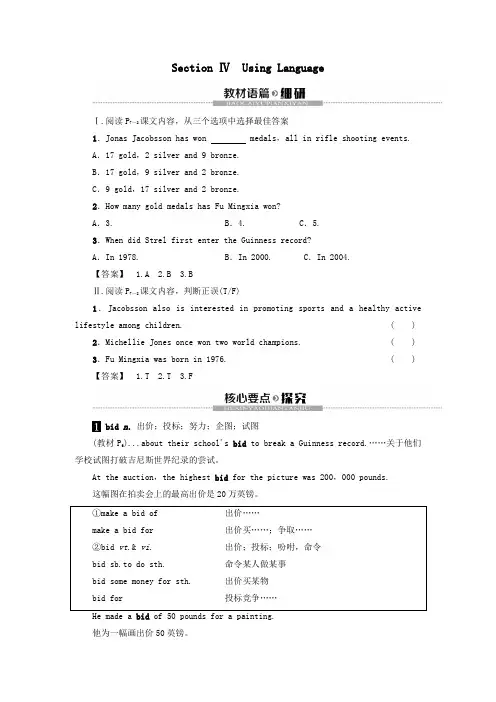
Section ⅣUsing LanguageⅠ.阅读P7-8课文内容,从三个选项中选择最佳答案1.Jonas Jacobsson has won medals,all in rifle shooting events.A.17 gold,2 silver and 9 bronze.B.17 gold,9 silver and 2 bronze.C.9 gold,17 silver and 2 bronze.2.How many gold medals has Fu Mingxia won?A.3. B.4. C.5.3.When did Strel first enter the Guinness record?A.In 1978. B.In 2000. C.In 2004.【答案】 1.A 2.B 3.BⅡ.阅读P7-8课文内容,判断正误(T/F)1.Jacobsson also is interested in promoting sports and a healthy active lifestyle among children. ( ) 2.Michellie Jones once won two world champions. ( ) 3.Fu Mingxia was born in 1976. ( ) 【答案】 1.T 2.T 3.Fbid n.出价;投标;努力;企图;试图(教材P6)...about their school's bid to break a Guinness record.……关于他们学校试图打破吉尼斯世界纪录的尝试。
At the auction,the highest bid for the picture was 200,000 pounds.这幅图在拍卖会上的最高出价是20万英镑。
他为一幅画出价50英镑。
He made a strong bid for the championship.他尽了最大的努力试图夺取冠军。
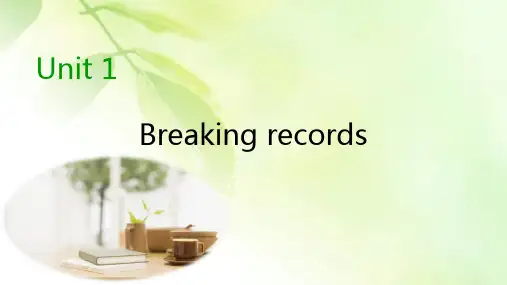

新人教版高中英语教案Unit one Breaking the record引言在英语教学中落实新课程标准,就是贯彻执行国家教育部关于课程改革的决定。
新课程标准的三维教学观,具体到英语学科就是要整合发展学生语言技能、语言知识、情感态度、学习策略和文化意识五个方面的素养,培养学生综合运用语言的能力探究学习、合作学习、任务型学习是在新课程标准下实施素质教育的关键环节,所以在我的教学设计里,时时体现着这几种原则。
教学设计理念1、运用任务型语言教学模式,训练培养学生对语言的综合运用,实现目标,感受成功,教学进度整体把握,教学形式不拘一格。
2、课堂以学生为主体,以任务为主线,重视体验参与,教师起到“设计者、研究者、促进者、协调者”的作用。
3、在教学中,突出交际性,注重读写的实用性,要进行情感和策略调整,以形成积极的学习态度,促进语言实际运用能力的提高。
4、课后访谈调查,读写摘记,重视语言运用。
5、正视个体差异,倡导过程激励,以多层次、多角度、多主体的结果与过程并重的评价方式激励进步。
一、学情分析一方面,高中年龄段的学生对周围的事物较为敏感,有自己的观点和看法,他们不满足于教科书上的知识,想获得更多的信息。
在英语学习上,他们不只是想把英语作为一门死记硬背的课程来学,更希望能学到知识性和趣味性兼有的内容,从英语学习中获得更多的知识和能力。
另一方面学生对体育比较感兴趣,对吉尼斯纪录有一定的了解因此,应结合学生的实际情况,因材施教,激发学生兴趣,让学生主动学习,学有所获。
二、教学内容分析(一)知识背景及新课程、新教材本单元以世界纪录为中心话题,只要内容涉及以阿里西塔福尔曼为代表的几个世界吉尼斯纪录的保持者及其运动经历,重点讨论了创造吉尼斯纪录所必备的身体素质心理素质创新意思以及挑战自我的决心和毅力语言和技能都是围绕这一中心展开的。
本课是是本单元第二课——“阅读课”,于是本单元的重点。
文章的主题是“路永在前方”其内容介绍了世界吉尼斯的保持者阿西里塔福尔曼,他不是职业运动员,但其运动成就让许多运动员望尘莫及,本课通过阿里西塔福尔曼的成长经历以及获得这些成就的精神动力激励学生认识自我的潜力找到精神动力的源泉,实现梦想。
新人教版英语高三选修9:Unit 1教案Unit 1 Breaking records!I.单元教学目标ReadingTeaching procedures & waysStep I Leading inT: Well, at the very beginning, here is a quite easy question for you: Do you know the host city for the 2008 Olympic Games?Ss: Of course! It's our capital city—Beijing!T: Yes, it's amazing. All of the people feel proud for our nation. Do you still remember the 2004 Olympic Games held in Sydney?Ss: Yes. In that Olympic Games, China has won 28golden medals and ranked the second.T: And who impressed you most?Ss: ( Students here may list quite a lot of sportsmen and sportswomen. And the teacher can take Liu Xi-ang as an example for he is the first Asian who won the golden medal in hurdling.)T: Yes, they are the heroes for our nation.Step II Warming UpT: Well, now, let's look at these pictures on Page 1 nd talk about how these participants are feeling.Ss: Exultant: Because Liu Xiang is the first sian who won the hurdling, which belongs tothe track and field —the weakest item for A sian.Calm: Participants are so strong in some certain spectator sports that they are confidentin winning the golden medals.Exciting: Their hard and dull practicing has been rewarded.We need make efferts to get a good achievementin some areas that are never surceed.T: Behind the applause, medals, flowers and praise, it is hard working, dull practicing, determination, and loneliness and persistent that assist them make the world records, keep them and break them. We admire them.Step III. Pre-readingFirst ask the students to match the pictures with teacher's introduction!Show the imtroductary words and corresponding pictures to the students one by one.1. A hula hoop is a ring made of wood or plastic, which is used for exercise and fun in gym or any playground. Were you one of those kids who could not resist hollering? Here's how to use one.Steps:a. Take hold of the hula hoop.b. Lower it down to about ankle level.c. Step into it (with both feet).d. Bring it up to just below your waist.e. Hold it with both hands and pull it forward so thatStep IV. Reading1.Fast readingQuickly glance through the text and tick the topics about Ashrita the author does not cover 2.Second readingNow read the story more carefully and answer the following questions in groups.3.DiscussionDiscuss some of the Ashrita’s beliefs.and explain.Step IV. Language pointsLanguage studyStep I Word StudyThis part is a consolidation of the words learnt in this unit. Get the students to do the exerciseindependently.Make students do Exx. 1. 2. 3 then check their answers.Sample answers for Ex. 3:Events: gymnastics, marathon, triathlon, track and field, swimming, boxing, tennis, volleyball, table tennis, basketball, soccer, horse-racing, yachting, springboard diving, high jump, horse - vaulting, parachute, heptathlon,The training: tough, tiring, stressful, demanding, difficult, hard, arduous, and laboriousThe event: fascinating, exciting, eye - catching, instructive, encouraging, and appealingStep II. Useful structuresThe students will learn the usage of subject in this part. First give them some examples of the subjects' usage in sentences. Get them to summarize the rules of now to use subject.T: Underline the subject in each sentence and analyze the structure of the subjects. Show students the following sentences.1) Our plane is taking off in five minutes.2) Both were offered jobs immediately.3) One-tenth of the population are elderly people.4) Singing is one of my interests.5) To act like that is childish.6) All work and no play makes Jack a dull boy.7) Whether it is a good plan remains to be seen.8) The unemployed lead a hard life.9) It is no use talking about it now.10) It is against the law to do that.Step III PraticePlease do EXX.1 2Listening and speakingStep I First listeningGet Ss to read exercise 1 and make sure that they understand the information they are listening for. While listening, practice note-taking and key information picking-up. At the same time, this part provides Ss with a topic of speaking.T: This is an interview with two Maryville High School students, Luke and Josh, about their school's bid to break a Guinness record. First look through the Exx. 1-3, and then listen to the tape. After students finishing the three exercises, the teacher can play the tape several times to get more details.Step II Second listening2 Read through the questions first in Ex 2. focus on the ideas as well as some specific information. Then check answers in groups.Step III. Third listening3 Play the listening text and stop it after each expression of surprise.Step IV SpeakingRole-play is carried out to help Ss express surprise properly. The Ss are free to create different situations, which also practices their imagination.T: Now it is time to practice using the expressions of surprise. One imagines or thinks of something amazing, and the other one chooses an expression of surprise from the list in Ex. 3 or any others that express surprise. Then you swap the roles. Let's read the example beforehand. SA: I once say a woman who was running backwardscarrying a bag of potatoes. SB: You're kidding! Ss practice in pairs. T: OK. Which group would like to present your workto us? Ss' role-plays must be various. If only their imaginary situation is a bit reasonable and they use the right SURPRISE expressions, teacher should highly evaluate it to encourage them totalk in English.Suppose Ss are not able to create as much situation as possible, teacher might offer helps, such as 1. — This novel sells well and is said to have broken the world selling records.—How amazing!2. — He has passed the entrance examination and been admitted to Beijing University. —Well, good luck! Tell me more about it.3. — It is reported that more than 100 people lost their lives due to the release of poisonous gas. —You're kidding!4. — The population of the earth is increasing so fast that the resources will not support us in lessthan 100 years.—You're right! That's really horrible!Task TwoIn groups, carry out tasks in Ex. 5. Sample answers:1. A. No. Although body painting is very popular and in style, yet it is not proper for students in middle schools.B. We can try to set a record of most people drawing masks of Beijing Opera.2. A. Most people drawing masks of Beijing Opera.Step IV AssignmentFinish Exx. 1-3 in LISTENING TASK on Page 56 in the workbook.Reading and writingStep I ReadingThe reading part is the preparation for the writing part, so teacher ought to pay more attention to the Ss' acquisition of the passage structure.T: You've done a great job in the listening practice! Now look at the reading passage on Page7.Tell me whom it talks about? Ss: Sportspeople.T: What is it about? Ss: The profile of these sportspeople.T: That's it! Now, read this passage carefully and then do the exercises on Page 9. After students complete these, teacher can explain some grammar points to the students. Refer to Grammar II in Appendices.Step II Post-readingGet the students to complete the exercise in ComprehendingStep III. WritingAsk Ss to write their own profile.。
第2讲Unit 1 Breaking records语法篇_______________________________________________________________________________ __________________________________________________________________________________ ___1.掌握主语定义及常用词;2.掌握主语从句的运用;3.利用所学语法知识书面表达;一.主语定义及构成主语表示句子主要说明的人或事物,一般由名词,代词,数词,不定式,动名词,词组或句子等充当。
二. 分类讲解1.名词做主语1)The doctor looked over Mrs. Brown very carefully.2)China does not want to copy the USA’s example.3)A mooncake is a delicious, round cake.4)The first truck is carrying a few baskets.5)The temperature will stay above zero.2.代词作主语1)He is a teacher.2)I don’t know if it will grow.3)That’s a bit expensive.4)You’d better buy a new pair.5)I’m afraid we haven’t got any black shoes.6) it作主语: 往往指代时间, 天气, 日期, 度量衡等; 或指代前面所提到的事物; 或未知的人等。
例如:a. Look at the house, it’s new.b. It’s my fault.c. It’s five o’clock.d. It is raining heavily outside.3. 数词做主语1) One and two is three.2) One is not enough for me. I want one more.3) One of them is English.4) Suddenly one of the bags fell off the truck.5) Two will be enough.4. 不定式作主语: 动词不定式表示比较具体的意义,经常和特定的动作和执行者联系起来,经常带时间或地点状语,有时表示将要发生的动作。
1) To master a foreign language is no easy job.2) To do it well is my earnest desire.3) To see this film is to waste time.4) To solve this problem is out of the question.**动词不定式作主语时,常见的另一种形式是在句首用先行代词it作形式主语,而将动词不定式移到谓语之后作真正主语。
用于这种形式是一些特定形容词,动词和名词。
如:1)形容词作表语(常见的形容词有:important, difficult, easy等)It is foolish to act in this way.2)动词作谓语(常见的动词有:require, cost, amuse等)It didn’t occur to me to ask him to help me.3) 名词作表语:It is a good idea to think this way.5. 动名词作主语1) Being happy is better than being king.2) Worrying never does anyone good.3) Yaoming’s rejoining in the team makes the teammate excited.(动名词作主语, 前面可加代词或名词的所有格做其逻辑主语。
)4) Collecting stamps is a good hobby.5) Swimming is a best sport in summer.(动名词表示比较抽象(一般)和经常性的意义,有时可同不定式互换。
)6)There is no telling what will happen.7) There is no denying the fact.8) There is no need informing him of it.9) 形容词作表语(常见的形容词有:enjoyable, good, hard, worthwhile)It is nice talking to you.10) 名词作表语It’s a waste of time doing this.(在句首用先行代词it作形式主语面将动名词短语移至谓语之后作真实主语。
)**主语为动词不定式和动名词时, 其谓语常用单数形式。
如:To give is better than to receive.It was difficult to see.It’s best to wear cool clothes.Playing is much better than having classes.6. 词组作主语1)Early to bed and early to rise makes a man healthy, wealthy and wise.2)The rich should contribute more to the world welfare.3)From 1990 till to 2003 is a long period of time.4)From Beijing to Guangzhou is a long distance .7. 从句作主语1)That he will come here on Wednesday is certain.2)Whether he will come here on Wednesday is not certain.** It作形式主语a. It is no good/ no use/ useless doing sth.例如:It is no use crying while the milk is split out.b. It is +adj.+of /for sb. to do例如:It is wise of him to carry out the plan of recycling the waste.It is difficult for me to run 800 meters in 3minutes.c. It is reported/known to all/ announced/ said...that从句例如:It is reported that Liuxiang quited the competition because he got injured in the leg.1. It worried her a bit ____ her hair was turning grey.A. whileB. thatC. ifD. for解析:分析题干,it是形式主语,从句句意完整只用that起引导作用是真正的主语。
答案:B。
2. _______ breaks the law will be punished.A. WhoB. WhoeverC. No matter whoD. Anyone解析:分析题干及选项,句子主语为“_______ breaks the law”,从而判断C、D不对;who指固定“谁(人)”,因此选B。
答案:B。
3. Tom’s mother kept telling him that he mustn’t smoke, but ____ didn’t help.A. heB. whichC. itD. they解析:分析题干,含有but的并列句缺少主语,而且可以代替前面整句话内容,用it。
答案:C。
4. ______ you don’t like him is none of my business.A. WhatB. IfC. ThatD. Whether解析:分析题干,主语为“______ you don’t like him”,从句句意完整,排除A;根据句意选C。
答案:C。
5. They live on a busy main road. ________ must be very noisy.A. ThereB. ItC. ThatD. They解析:根据句意,it代替上句中main road作主语。
答案:B。
6. _______ has helped to save the drowning girl is worth praising.A. WhoB. The oneC. AnyoneD. Whoever解析:分析题干及选项,句子主语为“_______ has helped to save the drowning girl”,从而判断B、C不对;who指固定“谁(人)”,因此选D。
答案:D。
基础演练A指出下列句中主语或主语中心词1. The teacher with two of his students is walking into the classroom.2. There is an old man coming here.3. The useful dictionary was given by my mother last year.4. To do today's homework without the teacher's help is very difficult.5. During the 1990s, American country music has become more and more popular.6. We often speak English in class.7. One-third of the students in this class are girls.8. To swim in the river is a great pleasure.9. Smoking does harm to the health.10. The rich should help the poor.11. When we are going to have an English test has not been decided.12. It is necessary to master a foreign language.Keys:1. teacher2. man3. dictionary4. To do5. music6. We7. One-third of the students8. To swim9. Smoking 10. The rich 11. When we are going to have an English text 12. It (to master a foreign language)B1. It never occurred to me ___ you could succeed in persuading him to change his mind. A.which B.what C.that D.if2. It's obvious to the students ________they should get well prepared for their future.A.as B.that C.which D.whether3. ________some people regard as a drawback is seen as a plug by many others.A.Whether B.What C.That D.How4. It is uncertain ________side effect the medicine will bring about,although about two thousand patients have taken it.A.that B.how C.what D.whether5. ________ Tom liked to eat was different from ________.A. That…that you had expectedB. What …that you had expectedC. That…what you had expected D . What…what yo u had expected6. ________ we go swimming every day ________ us a lot of good.A. If...doB. That...doC. If...doesD. That...does7. It ________ Bob drives badly.A. thinks thatB. is thought whatC. thought thatD. is thought that8. It's uncertain ________ the experiment is worth doing.A. ifB. thatC. whetherD. how9. ________ the boy didn't take medicine made his mother angry.A. ThatB. WhatC. HowD. Which10. ____ we can't get seems better than ____ we have.A. What, whatB. What, thatC. That, thatD. That, what11. ____ you don't like him is none of my business.A. WhatB. WhoC. ThatD. Whether12. ____ we'll go camping tomorrow depends on the weather.A. IfB. WhetherC. ThatD. Where13. _________is going to do the job will be decided by the Party committee.A. ThatB. WhyC. HowD. Who14. _______we'll finish translating the book depends on the time.A. WhenB. WhyC. WhatD. That15. ______he won't go there is clear to all of us.A. HowB. WhatC. WhyD. ThisKeys:1-5 CBBAD 6-10 DDCAA 11-15 CBDAC巩固提高一. 完成句子。